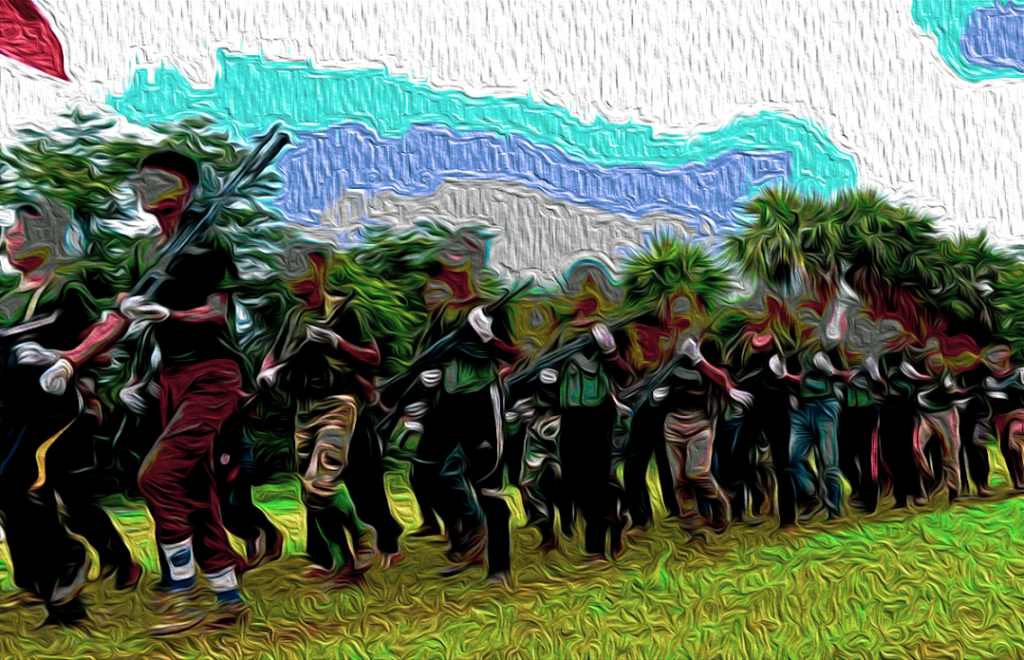Myanmar Spring Chronicle – September 09 Scenes
Published by MoeMaKa on September 10, 2023
Shifts in Armed Forces Leadership and Economic Challenges in Myanmar
Over the past two years, the Myanmar Royal Dragon Army (MRDA) established in Pale Township, Sagaing Division, has been a significant presence. Recently, tensions have arisen between the Ministry of Defence of the National Unity Government (NUG) and Bo Nagar, a prominent figure in MRDA. Initially, the NUG’s Ministry of Defence transferred four of Bo Nagar’s armed battalions to the MRDA. Subsequently, the commanders and members of those battalions reportedly decided to align themselves with the NUG’s chain of command (COC). Following these developments, social media witnessed weeks of disputes between Bo Nagar and NUG’s fundraisers.
In the wake of these issues, an announcement emerged about the establishment of an armed group under the banner of the Burma National Revolutionary Army (BNRA). The situation between the MRDA, based in Pale Township, Yinmarbin District, Sagaing Division, and its leader, Bo Nagar, prompts reflection on the political dynamics, ideological differences, and interplay among defense forces in the armed struggle within Sagaing Division. In regions with a majority of Burman residents, such as Sagaing and Magway Divisions, political and military entities affiliated with ethnic groups are relatively weak. This raises questions about whether these forces align more with NLD party members and NLD MPs in political and military leadership positions.
However, even before the establishment of the NUG government, local defense forces had already been formed by residents in these areas shortly after the military coup. Bo Nagar’s MRDA represents one of these armed groups formed by local residents without any political party affiliation. Similar small armed groups have surfaced in Sagaing, the northern part of Magway, and Mandalay Divisions, without direct political affiliations. Bo Nagar’s group, given its relative prominence and news media coverage, can be considered stronger than other local armed forces. Consequently, it raises questions about the relationships, cooperation, and problem-solving among these local armed groups and forces like PDF, PaKaFa, PaAFa, etc., which later aligned with the NUG in Sagaing Divisions. Given the distinctive characteristics of the Sagaing region, separate from the ethnic regions, discussions are needed to identify a common political foundation for organizing anti-dictatorship armed groups in the region.
In the early 2003s, an initiative known as the Sagaing Forum aimed to bring together anti-military armed groups and civil organizations in Sagaing Region. However, suspicions and allegations that the Sagaing Forum was manipulated for political gain hindered its progress, resulting in no clear consensus.
As events surrounding Bo Nagar and the restructuring of armed forces unfold, the significance of collaboration between political leadership and military activities in Sagaing is once again highlighted. While the NUG may argue that they already have PDF, PaKaFa, PaAFa, and PaLaFa under their umbrella, it remains crucial to prevent war crimes and human rights violations in Sagaing Region. Instances of attacks, killings between revolutionary forces, and human rights violations, including those committed by some members of these forces, are equally important to address.
Another pressing issue is the mismanagement and corruption within the military council. A closer look at the economic situation during the military council’s administration reveals a landscape marked by turmoil. Recent developments, such as the soaring prices of palm oil and the arrest and investigation of certain palm oil importers, have shed light on the involvement of senior officials from the military council in bribery.
The news of the arrest and investigation of the chairman of The Trade and Commodity Acceleration Working Committee has come to the forefront in recent days, alongside reports of inquiries into senior commerce officials. Since early last year, the military council has continuously issued regulations, including directives to restrict the use of foreign currency, mandatory exports at exchange rates significantly lower than market rates, and compulsory currency exchange within specified timelines. These measures have thrown import and export businesses and foreign currency exchange rates into disarray, causing the value of the Myanmar kyat to plummet over the past two years.
Now, the price of daily essentials like palm oil, peanut oil, and soybean oil has surged, making them unaffordable for many. In response, the military council arrested businessmen, exerted pressure, and coerced palm oil distributors into selling at fixed prices, resulting in the resurgence of long queues to purchase essential food items. These scenes evoke memories of past eras marked by rationing and scarcity, reminding us of the challenges Myanmar faces in its economic landscape.

